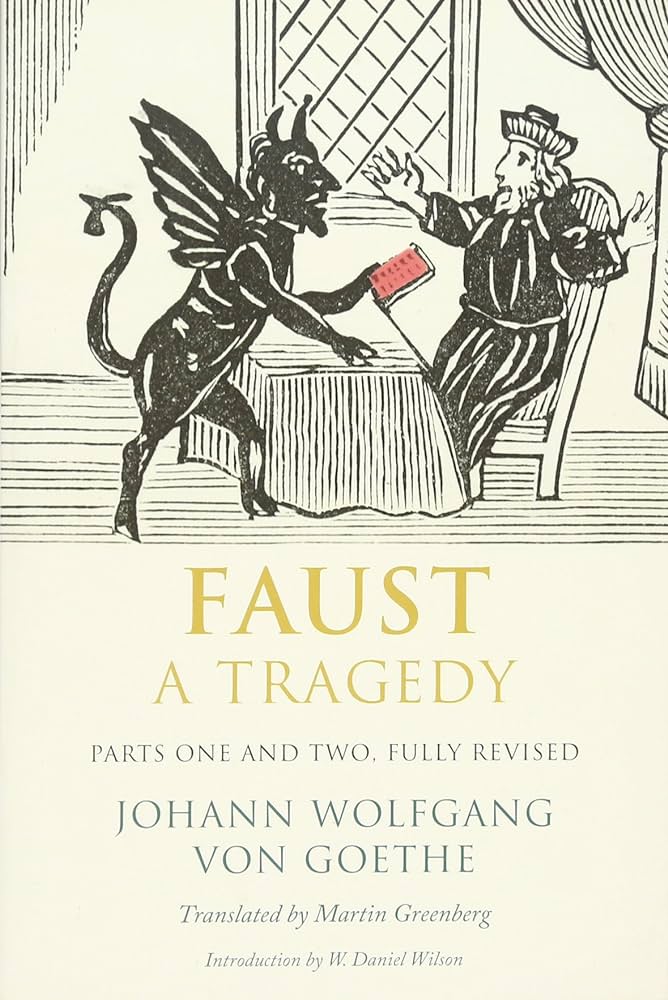The play “Faust” is a significant theatrical work among world classics, written by the renowned German playwright Johann Wolfgang von Goethe. Faust is a synthesis of all the works of the author.
Summary of Faust Book
Faust, also known as Fautus or Doctor Faustus, is the protagonist of one of the most timeless legends in Western folklore and literature. This story narrates the tale of Faust, a German magician or astrologer who bargains away his soul to the devil in return for knowledge and power. There was indeed a historical figure named Faust, possibly even two, one of whom referred to the devil as a Schwager or friend. Both are said to have died around the year 1540, leaving behind a complex legend interwoven with practices such as witchcraft, alchemy, astrology, prophecy, theological and demonic studies, sorcery, and even sodomy.
Contemporary observers noted that Fautus was widely traveled and quite well-known, but with a reputation that was universally negative. Humanist scholars of the time dismissed his magical abilities as trivial and fraudulent, yet he was taken seriously by Lutheran priests like Martin Luther and Philipp Melanchthon. Ironically, the relatively obscure Faust was preserved in the legend as a representative sorcerer of the era alongside figures like Paracelsus, Nostradamus, and Agrippa von Nettesheim.
Faust owes much of its posthumous fame to the anonymous author of the first Faustbuch (1587). This book retold stories about ancient wizards proficient in occult sciences, also featuring other famous magicians like Merlin, Albertus Magnus, and Roger Bacon. The Faustbuch narratives were roughly recounted and scornfully mocked the naive aspects of Fautus with sarcastic humor. The author’s vivid descriptions of Faust’s terrifying demeanor and a sense of pity for his dreadful state created a realistic and fear-inducing portrayal.
The Faustbuch quickly spread and was read across Europe. An English prose translation in 1592 inspired Christopher Marlowe’s play “The Tragical History of D. Fautus” (1604), enhancing the Faust legend with tragic nobility. Marlowe more effectively used the summoning of Helen from the underworld to ensure Faust’s damnation. Marlowe retained many of the crude humor and clown scenes from the Faustbuch, which were further amplified in German versions of Marlowe’s play. This combination of tragedy and buffoonery played a significant role in the popularity of Fautus dramas and puppet shows for two centuries. In the early versions, Faust’s eternal damnation was unquestionable.
The publication of magic books bearing Faust’s name became a lucrative trade. These books contained careful instructions on how to prevent or, when necessary, break a two-sided deal made with the devil. One of these classics, “Magia Naturalis et Innaturalis,” was found in the grand duke’s library in Weimar, Germany, and was known to J.W. von Goethe.
German writer Goethe took on the salvation of Faust in an unfinished play in 1780. The Enlightenment rationalist Lessing viewed Faust’s quest for knowledge as a noble pursuit and reconciled the hero with God. This approach was similarly embraced by Goethe, the most significant narrator of the Faust legend. Goethe’s verse drama “Faust” (Part One, 1808; Part Two, 1832) provides a profound but highly ironic interpretation of the conflicting possibilities of Western cultural heritage.
The play offers a varied cultural interpretation encompassing epic, lyric, dramatic, operatic, and balletic elements, utilizing various poetic meters and styles. It delves into theology, science, philosophy, music, mythology, aesthetics, political economy, and literature, presenting an extensive cultural interpretation. Ultimately, Goethe redeems Faust through purification and salvation.
Hector Berlioz drew inspiration from Goethe’s dramatic poetry in creating “The Damnation of Faust,” a dramatic cantata based on the French version by Gérard de Nerval. This work premiered in 1846 and has also been staged as an opera. Charles Gounod composed the opera “Faust” based on Part One of Faust, with a libretto by Jules Barbier and Michel Carré. It first premiered in Paris in 1859.




Really good info can be found on web site.!